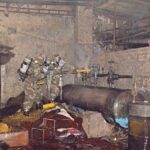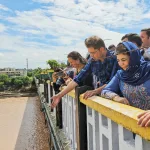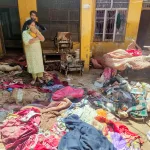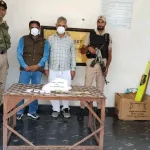Areas of Jammu and Kashmir under the illegal occupation of Pakistan known as Pakistan Occupied Jammu and Kashmir (POJK) are witnessing unprecedented bloodshed, violence and human rights violation of the people by the Pakistan Rangers. As per the official reports three persons have been killed and six have suffered injuries due to the firing and teargas shelling by Pakistani rangers in Muzaffarabad as people were protesting over rising costs of food, fuel and other necessary day to day commodities on Tuesday. The incident happened as the Pakistani Rangers were moving out of the territory from Kohala after the government announced a Rs 23 billion subsidy to placate the protesters. As the 19-vehicle convoy of the Rangers reached Muzaffarabad, it was pelted with stones near Shorran da Nakka village, prompting the security personnel to respond with teargas and firing. Videos of protestors that are going viral on social media show the people raising pro Azadi (secession from Pakistan ) slogans. The Jammu and Kashmir Joint Awami Action Committee (JAAC), which has been spearheading the protests, asked the demonstrators to resume their march, saying the Pakistani government did not fulfil all their demands. The violent street protests in POJK, which erupted around May 10, have left more than 90 people injured. On Sunday, Pakistani Prime Minister Shehbaz Sharif approved the release of Rs 23 billion for POK for power and wheat subsidies to placate the protesters.But people are not relenting. The rate for 40 kg of flour was reduced to Rs 2,000 from Rs 3,100. The electricity tariff was also reduced to Rs 3, Rs 5 and Rs 6 per unit for up to 100, 300, and more than 300 units. A general strike halted Muzaffarabad, the capital and largest city of POJK, as public transport, shops, markets, and businesses shut down. As large numbers of protesters broke barricades and clashed with police in the Mirpur and Muzaffarabad divisions. On Sunday, the paramilitary Rangers were called in to secure government buildings such as the legislative assembly and the courts. Pakistan’s economy has been witnessing extremely high inflation and dismal economic growth for more than two years due to rising energy costs. Consumer inflation has been above 20% since May 2022, and touched 38% in May 2023. Leaders in POJK have been protesting alleged discrimination by the government in Islamabad in the distribution of power to the area. Dawn reported on complaints by the region’s premier Chaudhry Anwarul Haq about not receiving their fair share of the 2,600MW of hydropower produced by the Neelum-Jhelum project. He has also said that his request for resources to increase salaries of government employees in the recent budget was not accepted, and that he had been forced to divert development funds to pay them. Traders in POJK were hit hard after India raised customs duty to 200% on Pakistani products such as dry dates, rock salt, cement, and gypsum following the Pulwama terror attack of February 2019. As a result, Pakistan’s exports to India fell from an average of $45 million per month in 2018 to only $2.5 million per month between March and July 2019. The situation was made more difficult after Pakistan stopped all trade following the neutralisation of Article 370 and 35A by India in Jammu and Kashmir in August 2019. India-Pakistan trade has shrunk to a low of about $2 billion annually over the last five years, a small fraction of the $37 billion trade potential estimated by the World Bank. Pakistan’s foreign exchange reserves have fallen drastically ever since global food and fuel prices rose in the aftermath of the Russia-Ukraine war. A similar balance of payments crisis crippled Sri Lanka as well in 2022-23, leading India to extend support measures. Pakistan’s FOREX reserves fell from a peak of $20.1 billion in August 2021 to $2.9 billion in February 2023, enough to cover only a month’s imports. Pakistan imports nearly 40% of its total primary energy supply. Chickens have come home to roost. People in POJK have realised that after illegal occupation of the Jammu and Kashmir territories in 1947 when the princely state acceded to India, Pakistan has exploited them to the worst possible limits. It has vandalised its ecosystem and environment and subjected the political activists to severe human rights violations .Most of them are in exile. Liberation movement in POJK is getting catalysed from outside. As a large number of POJK diaspora is leading the movement for secession from Pakistan .It is pertinent to mention that in 1994 Indian parliament passed a unanimous resolution that upholds entire princely state of Jammu and Kashmir as its integral part and vows to reclaim it and free it from the illegal occupation of Pakistan. Pakistan has used POJK as the launching pad to engineer terrorism against India in Jammu and Kashmir and indulged in genocide of innocent people. The changing political dynamics in POJK clearly show that POJK is on the path freedom from Pakistan. Its people want end of slavery imposed on them by Pakistan. India must offer helping hand to the people of POJK and save them from genocidal attrition and human rights violations being imposed on them by Pakistan.
POJK Demands “Azadi” from Pakistan

Sign Up For Daily Newsletter
Be keep up! Get the latest breaking news delivered straight to your inbox.
By signing up, you agree to our Terms of Use and acknowledge the data practices in our Privacy Policy. You may unsubscribe at any time.
Leave a Comment Leave a Comment
Stay Connected
Latest News
Recent Posts
- “Centre’s Rs 209 crore package not enough”: Mehbooba Mufti demands additional funds for relief, rehabilitation
- J&K online RTI portal functions in compliance with RTI Act, 2005: IT Deptt
- District Administration Jammu sanctions ₹1.07 crore relief for flood-affected families
- Two gamblers arrested in Ganderbal, stake money seized
- Snowfall in Higher Reaches of Mountains in Sonmarg Ganderbal







